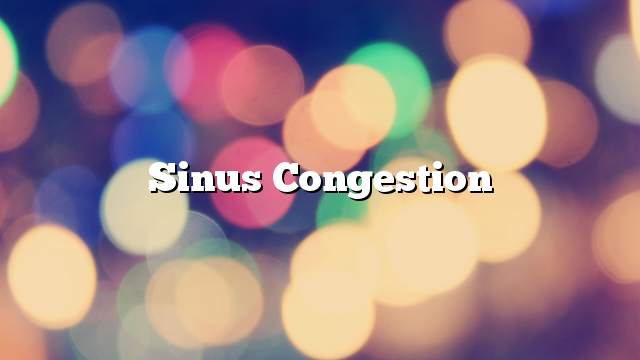Sinus congestion
Sinus congestion is inflammation of the mucous lining lining the sinus cavity, which causes the closure of the openings of these sinuses, and filled with fluid, and therefore feeling pain, and a sense of pressure on the nose, and know that sinus congestion may occur as a result of several factors, including: Smoking, exposure to cigarette smoke, swimming, exposure to dry air, ciliary dysfunction, etc. In this article we will introduce you to sinus congestion.
Symptoms of sinus congestion
- Pain around the eyes, and in the cheekbones.
- Bouts of sneezing.
- Temporary loss of sense of smell.
- The incidence of coughs.
- Red eyes, and sensitivity to direct light.
- May lead to toothache and a foul odor in the mouth.
- High temperature.
- Fatigue and fatigue in the body.
Types of sinus congestion
- Acute sinus congestion: Occurs suddenly, usually lasts for four weeks or less, and symptoms are similar to the symptoms of colds, such as: blockage of the nose, and its effects, and the occurrence of facial pain.
- Sub-acute sinus congestion: It takes about four weeks to eight weeks.
- Chronic sinus congestion: It takes about eight weeks.
- Frequent sinus congestion: It occurs in the form of fits of congestion over a year.
The most susceptible to sinus congestion
- Sufferers of blocked nasal passages, mucosal swelling caused by colds, and immunodeficiency, as well as people taking drugs that inhibit the immune system in the body.
- Children with allergies, while adults increase the incidence of smoking among them.
Sinus Treatment Methods
- Use a saline solution that is used to clean nasal passages.
- The use of depressants, which may vary in their forms, where they can be in the form of tablets, or sprays, or syrup.
- It is best to consult your doctor before taking the painkillers, because some of them may lead to increased congestion.
- Antibiotics: Antibiotics are a successful method in the case of congestion caused by bacteria, but if the stress is due to non-bacterial reasons, antibiotics are not useful in this case.
- If immunosuppression is a cause of congestion, immunotherapy may help to reduce the body’s interaction with allergies.
- Surgery Surgery is the last step in the event that the drugs do not succeed in the treatment of congestion. The surgery is performed by a telescope with light to review the sinus passages.
